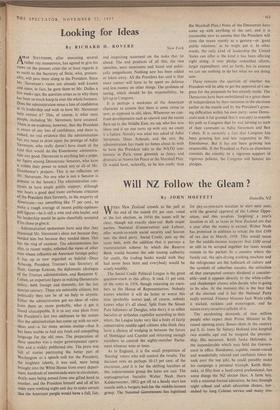Looking for Ideas
By RICHARD H. ROVERE
New York
ADLAI STEVENSON, after executing several .Administration spokesmen have said that they requested Mr. Stevenson's ideas not because they needed him but because they needed ideas. This has the ring of candour. The administration has also, in recent weeks, solicited the views of other men whose influence on American foreign policy it has up to now regarded as baleful—Dean Acheson, President Truman's last Secretary of State; George Kennan, the diplomatic idealogue of the Truman administration, and Benjamin V. Cohen, an important figure in making Democratic Policy, both foreign and domestic, for the last quarter-century. These are estimable citizens, but Politically they can be of no help to anyone. Either the administration got no ideas of value from them or, more probably, what it got it found unacceptable. It is in any case plain from the President's last two addresses to the nation that the administration has come up with no new ideas and—a far more serious matter—that it has been unable to find any fresh and compelling language for the old ones. The preparation of these speeches was a major governmental opera- tion and a widely publicised one. The press was full of stories portraying the better part of Washington as a speech mill for the President; the brightest talents, it was said, were being brought into the White House from every depart- ment, hundreds of memoranda were in circulation, drafts were being passed from one gifted hand to another, and the President himself and all of his aides were working night and day to make certain that the American people would -have a full, fair, and inspiriting statement on the tasks that lie ahead. The end products of all this, the two speeches, were wearisome and banal and politi- cally insignificant. Nothing new has been added or taken away. All the President has said is that more money will have to be spent on defence and, less money on other things. The problem of saving, which should be his responsibility, he left up to Congress.
It is perhaps a weakness of the American character to assume that there is some virtue in new, as opposed to old, ideas. Whenever we con- front developments such as sputnik and the recent flare-up in the Middle East, we ask who has new ideas and if no one turns up with any we count it a failure. Novelty was what was asked of Adlai Stevenson, Dean Acheson, and the rest; the administration has made no bones about its wish to have the President take to the NATO Con- ference: in Paris some gimmick as fancy. and diamatic as Atoms fcir Peace or the Marshall Platt. (It would have, naturally, to be less costly than the Marshall Plan.) None of the Democrats have come up with anything of the sort, and it is reasonable now to assume that the President will cross the ocean mainly as a gesture—or 'good public relations,' as he might put it. In other words, the only kind of leadership the United States can offer is the kind it has been offering right along; it may pledge redoubled efforts, larger expenditure, and so forth, but in essence we can see nothing to do but what we are doing now.
There remains the question of whether the President will be able to get the approval of Con- gress for the proposals he has-already made. The Democrats have been emboldened to a great show of independence by their successes in the elections earlier in the month and by the President's grow- ing difficulties within his own party: some Demo- crats took it for granted that it was only to smooth his path in Congress that he was turning to' such of their comrades as Adlai Stevenson and Ben Cohen, It is certainly a fact that Congress has been growing lesi and less responsive to Mr. Eisenhower. But it has not been growing less responsible. If the President at Paris or elsewhere commits the country to a vigorous support Of vigorous policies, the Congress will honour his pledges.










































































 Previous page
Previous page